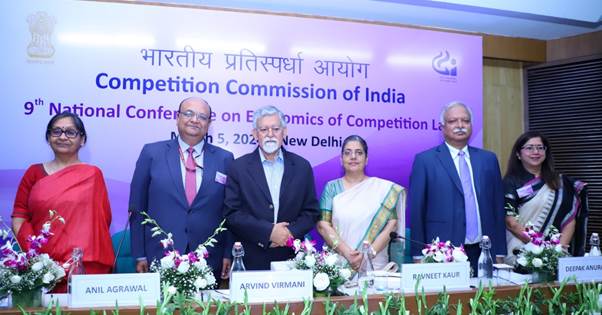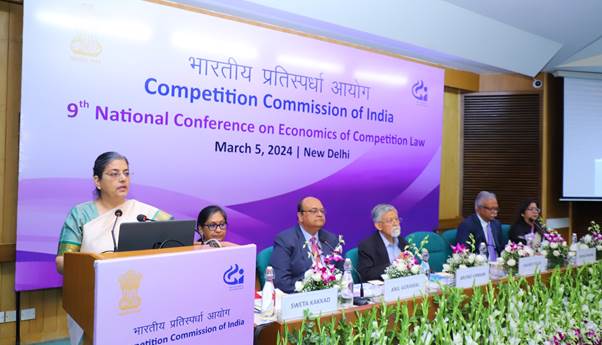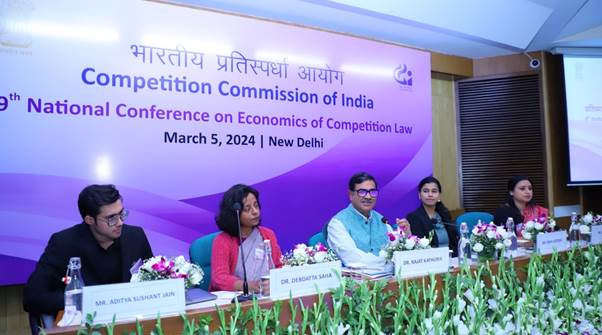Competition Commission of India
CCI organises 9th edition of National Conference on Economics of Competition Law
Vital elements of Bharatiya Model of Inclusive Development were Indic market economy, antodaya empowerment and holistic approach: Dr. Arvind Virmani
CCI will soon commence a Market Study on AI to develop a comprehensive understanding of evolving landscape of AI and AI use cases in markets in India: CCI Chairperson
प्रविष्टि तिथि:
05 MAR 2024 6:18PM by PIB Delhi
The Competition Commission of India (CCI) organised the 9th National Conference on Economics of Competition Law in New Delhi today. Dr Arvind Virmani, Member, NITI Aayog was the Keynote Speaker and Smt. Ravneet Kaur, Chairperson, CCI, delivered the Special Address at the Inaugural Session of the Conference. The Conference, which brought together scholars, practitioners, and experts working in the area of economics of competition law, is being organised by the CCI every year since 2016.

In his Keynote Address, Dr. Arvind Virmani, Member, NITI Aayog, elucidated the role of competitive markets in fostering inclusive growth and said, the vital elements of the Bharatiya Model of Inclusive Development were the Indic market economy, antodaya empowerment and a holistic approach.
Highlighting the specificities of the Indic market economy, Dr. Virmani said that the role of government and regulators here was to create efficient markets. In a developing economy context, competition regulation should be anchored in the overall objective of economic growth and efficiency, besides attempting to discipline and incentivise the private sector, he added.

With regard to the imperative of creating missing markets and improving imperfect markets, Dr. Virmani referred to the unbundling of competitive and monopoly elements and auction mechanisms. He also talked about reforms in the last 10 years, including systematic policy reforms such as factor market reforms, institutional reforms such as IBC, GST as well other bureaucratic reforms and social welfare reforms.
Dr. Virmani underscored the need to account for share of imports and the open economy implications in the framework of competition assessment. Referring to tariff protection as an important determinant of competition in tradeable goods, Dr. Virmani said in case of inadequate competition, reduction in tariff may be considered. Hence, competition regulation cannot focus only on the local markets in isolation. While discussing how the digital sector is set to drive growth, Dr. Virmani discussed the recent initiatives to reduce inequality using digital and hybrid systems.
In her Special Address on the occasion, Smt. Ravneet Kaur stated that markets can deliver efficient outcomes to benefit the economy and consumers only when competitive opportunities are preserved and anti-competitive impediments are removed. Smt. Kaur said that the CCI’s endeavour has been to keep its interventions embedded in the understanding of economics of markets, the facts of the cases as well as sector specificities.

Referring to the recent amendments to the competition law in India, Smt. Kaur mentioned that leniency plus regulations have already been notified and other regulations on settlements, commitments, computation of turnover, deal value threshold are in the pipeline. CCI is also in the process of notifying penalty guidelines, Smt. Kaur added.
In view of the growing importance of artificial intelligence (AI), Smt. Kaur said that the CCI will soon commence a Market Study on AI to develop a comprehensive understanding of the evolving landscape of AI and AI use cases in markets in India, which could inform the strategies of the CCI aimed at fostering innovation and fair competition.
The Conference, in addition to the Inaugural Session, featured two technical sessions on ‘Regulation of Competition in Digital Markets: Emerging Approaches, Theories and Tools’; and ‘Competition, Consolidation and Innovation: Trends and Perspectives’ where researchers presented papers on economics of competition law.
The first session chaired by Dr. Rajat Kathuria, Professor & Dean, School of Humanities and Social Sciences, Shiv Nadar University, had papers dealing with regulation of competition in digital markets.

Papers in the second session chaired by Dr. Rohit Prasad, Professor, Economic and Public Policy, Management Development Institute, Gurgaon focused on competition, consolidation and innovation.

The National Conference concluded with a Plenary Session on ‘Artificial Intelligence: Challenges and Opportunities’ which was moderated by Dr Arghya Sengupta, Founder and Research Director, Vidhi Centre for Legal Policy.

****
NB/VM/KMN
(रिलीज़ आईडी: 2011687)
आगंतुक पटल : 1728